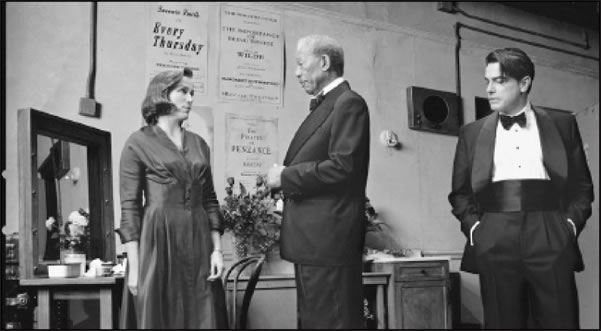By Scott Harrah
THE COUNTRY GIRL
Written by Clifford Odets
Directed by Mike Nichols
Bernard B. Jacobs Theatre
242 W. 45th Street
(212-239-6200; thecountrygirlonbroadway.com)
A revival of a classic starring two Oscar winners and directed by the venerable Mike Nichols (a multiple Oscar and Tony winner himself) might normally be something New York theater fans would be thrilled about. However, this anemic production of the 1950 Clifford Odets drama—which was made into a 1954 movie starring Bing Crosby, William Holden and Grace Kelly, who won an Oscar for her performance—is a major disappointment on so many levels. The main problem is that there’s simply no true chemistry between acting heavyweights Morgan Freeman and Frances McDormand in the lead roles.
Don’t get the wrong idea. Freeman, as Frank Elgin, and McDormand, as his wife Georgie, both give excellent performances, but they are unfortunately miscast and simply not believable as a washed-up, alcoholic actor and his devoted spouse.
Peter Gallagher plays Bernie Dodd, a big-shot director who wants Frank Elgin to take the lead in a Broadway-bound play that’s about to start try-outs in Boston. The trouble is that Frank has been drinking heavily ever since the death of his 4-year-old daughter and running into financial troubles. Only Frank’s wife Georgie is able to give him the confidence to get back to work, after being convinced by Bernie that the actor has what it takes to come out of his booze-soaked fog and take the stage once more.
Like the recent revival of “Come Back, Little Sheba”—also written and set in the ’50s—this show is anachronistic, and it’s difficult to make some period pieces seem relevant in the 21st century without adding a unique spin. The dramas of Shakespeare, Chekhov, Ibsen, Williams, and Miller are revived all the time, but they possess enduring themes and narratives compelling enough to enthrall new audiences.
The works of Clifford Odets are full of theatrical “mothballs” and this particular play reeks of them. “The Country Girl” is set in an era when nearly everyone chain-smoked and radio was commoner than TV. Snippets of music from the ’50s is played between scenes, and the dialogue is loaded with dated references to things such as Laurette Taylor’s role in the 1945 premiere of Tennessee Williams’s “The Glass Menagerie.” Only theater historians, Williams’ aficionados or people who saw the original production will have any idea of what the characters in “The Country Girl” are talking about. (Like the character Frank Elgin, Laurette Taylor was allegedly an alcoholic who made a stellar comeback on Broadway.)
Tim Hatley’s sets—from backstage dressing rooms to the modest apartment in which the Elgins reside—are dark and drab, adding to the lifelessness of the show.
Much of the drama centers on Frank’s continuously falling off the proverbial wagon. When he catches a cold, he’s guzzling cough syrup that’s 22% alcohol, so he’s flubbing and forgetting lines while performing in the play-within-the-play. There’s constant tension between both Frank and Georgie, but Bernie also has many verbal altercations with the wife. She feels that the director doesn’t understand her good intentions toward Frank, and there’s also sexual tension between the two that simply makes little sense due to Peter Gallagher’s uneven performance. Gallagher, a stage and screen veteran, is normally great, but here he lacks the charisma to make the role of Bernie convincing.
There are still some good supporting performances. Remy Auberjonois as the young playwright Paul Unger is exceptional, as is Chip Zein as the cigar-smoking producer Phil Cook.
Overall one would expect something far more outstanding than this from a legendary director like Mike Nichols. It’s a shame he is unable to get McDormand and Freeman to perform together cohesively, but with this odd casting, that’s understandable. The 70-year-old Freeman seems old enough to be McDormand’s father. Making their purported years of spiraling downward seem plausible requires emotional sparks.



























